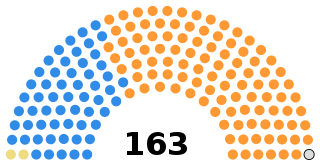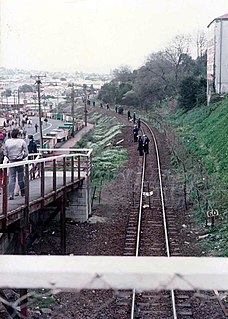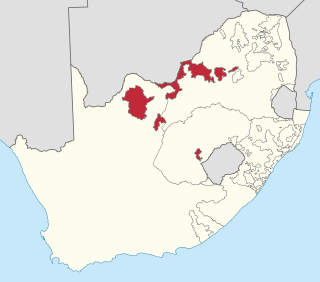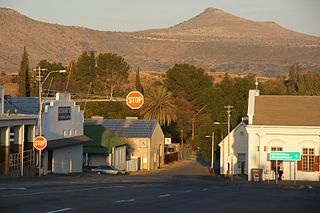 W
WGeneral elections were held in South Africa on 26 May 1948. They represented a turning point in the country's history, as despite receiving just under half of the votes cast, the United Party and its leader, incumbent Prime Minister Jan Smuts, were ousted by the Herenigde Nasionale Party (HNP) led by D. F. Malan, a Dutch Reformed cleric.
 W
WGeneral elections were held in South Africa on 15 April 1953. The elections consolidated the position of the National Party under D. F. Malan, which won an absolute majority of the 156 elected seats in the House of Assembly. The United Party under JGN Strauss lost several seats, and suffered several splits after the election.
 W
WGeneral elections were held in South Africa on 16 April 1958. The result was a victory for the National Party, under the leadership of J.G. Strijdom, which won 103 seats in the House of Assembly. It was the first election in South Africa with a whites-only electorate, following the removal of the Cape Qualified Franchise in the late 1950s to be replaced by four (white) MPs elected to represent Coloured voters in separate constituencies.
 W
WA referendum on becoming a republic was held in South Africa on 5 October 1960. The Afrikaner-dominated right-wing National Party, which had come to power in 1948, was avowedly republican, and regarded the position of Queen Elizabeth II as head of state as a relic of British imperialism. The National Party government subsequently organised the referendum on whether the then Union of South Africa should become a republic. The vote, which was restricted to whites – the first such national election in the union – was narrowly approved by 52.29% of the voters. The Republic of South Africa was constituted on 31 May 1961.
 W
WGeneral elections were held in South Africa on 18 October 1961. They were the first general elections after South Africa became a republic following the 1960 South African referendum. The National Party under Hendrik Frensch Verwoerd won a majority in the House of Assembly.
 W
WGeneral elections were held in South Africa on 30 March 1966. The result was another comprehensive victory for the National Party under Hendrik Frensch Verwoerd.
 W
WGeneral elections were held in South Africa on 22 April 1970 to elect members of the 166-seat House of Assembly. Parliament was dissolved on 2 March and the deadline for the submission of candidates was 13 March. This was the first time in South African history that the House elected was responsible entirely to white people, as the seats of the four MPs elected separately by "qualified" Cape Coloured voters expired in the same year, heralding the completion of the process of political apartheid. Similarly, it was the first election after the expulsion of Albert Hertzog and many verkrampte (hardline) representatives from the ruling National Party in 1969, who formed the new opposition Herstigte Nasionale Party in opposition, with limited success.
 W
WGeneral elections were held in South Africa on 24 April 1974. They were called one year earlier than scheduled by Prime Minister John Vorster on 4 February. The House of Assembly was increased from 166 to 171 members. The election was once again won by the National Party, with a slightly increased parliamentary majority.
 W
WGeneral elections were held in South Africa on 30 November 1977. The National Party, led by John Vorster won a landslide victory in the House of Assembly. The newly formed Progressive Federal Party, led by Colin Eglin became the official opposition. The New Republic Party, successor to the United Party, won only 10 seats, all but one of them in Natal Province. Once again, the Herstigte Nasionale Party failed to win any seats.
 W
WThe 1981 South African rugby tour polarised opinions and inspired widespread protests across New Zealand. The controversy also extended to the United States, where the South African rugby team continued their tour after departing New Zealand.
 W
WGeneral elections were held in South Africa on 29 April 1981. The National Party, under the leadership of P. W. Botha since 1978, lost some support, but achieved another landslide victory, winning 131 of 165 directly elected seats in the House of Assembly.
 W
WGeneral elections were held in South Africa in August 1984 to elect Coloured and Indian representatives to their respective houses of the Tricameral Parliament. The Coloured elections for the House of Representatives took place on 22 August, and resulted in a victory for the Labour Party, headed by the Reverend Allan Hendrickse, which won 76 of the 80 seats. The Indian elections for the House of Delegates were held on 28 August and saw the National People's Party emerge as the largest party, winning 18 of the 40 seats. The Indian elections were opposed by the United Democratic Front and were marked by boycotts and protests. Despite the Prohibition of Political Interference Act of 1968 which banned mixed-race political parties, nine Indian members of Hendricke's Labour Party stood as independents, one of whom won a seat and subsequently joined the NPP.
 W
WGeneral elections were held in South Africa on 6 May 1987. The State of Emergency cast a cloud over the elections, which were again won by the National Party (NP) under the leadership of P. W. Botha, although for the first time it faced serious opposition from the right of the South African political spectrum. The election resulted in the creation of the Second Botha Cabinet, which held power until 1989.
 W
WGeneral elections were held in South Africa on 6 September 1989, the last under apartheid. The elections were called early to gauge support for the recently elected head of the National Party (NP), F. W. de Klerk, who was in the process of replacing P. W. Botha as the country's president, and the new leader's program of reform to include further retreat from the policy of apartheid. The advent of the Conservative Party had realigned the NP as the moderate party, expected to initiate negotiations with the Black opposition, with the liberal opposition openly seeking a new settlement.
 W
WA referendum on ending apartheid was held in South Africa on 17 March 1992. The referendum was limited to white South African voters, who were asked whether or not they supported the negotiated reforms begun by State President F. W. de Klerk two years earlier, in which he proposed to end the apartheid system that had been implemented since 1948. The result of the election was a large victory for the "yes" side, which ultimately resulted in apartheid being lifted. Universal suffrage was introduced two years later.
 W
WOn 8 October 1993, Mzwandile Mfeya, Sandiso Yose, twins Samora and Sadat Mpendulo and Thando Mtembu were shot dead in a South African Defence Force (SADF) raid on an alleged base of the Azanian People's Liberation Army (APLA), the Pan Africanist Congress' military wing, at the Mpendulo family home in the Northcrest suburb of Mthatha. The house belonged to a PAC member Sicelo Mpendulo, the father of Samora and Sadat. According to PAC and police sources in the Transkei, the five victims were killed in their beds. The raid was authorised by President F. W. de Klerk.
 W
WAlexander Sinton Secondary School, also known as Alexander Sinton High School, is an English-medium school in Athlone, a suburb of Cape Town, South Africa. The school is located in the Cape Flats, an area designated as non-white under the Group Areas Act during apartheid. The school was involved in the anti-apartheid student uprisings of the 1970s and 1980s. Staff and students at the school made headlines when they barricaded the police into their school in September 1985. The following month, three youths were killed near the school by police officers who opened fire on protesters in the Trojan Horse Incident. It was the first school to be visited by Nelson Mandela after his release from prison. As of 2014, the school has 1,100 pupils, half boys and half girls. The school employs 40 teachers and six non-teaching staff.
 W
WThe Bisho massacre occurred on 7 September 1992 in Bisho, in the then nominally independent homeland of Ciskei which is now part of the Eastern Cape in South Africa. Twenty-eight African National Congress supporters and one soldier were shot dead by the Ciskei Defence Force during a protest march when they attempted to enter Bisho to demand the reincorporation of Ciskei into South Africa during the final years of apartheid.
 W
WThe 1994 Bophuthatswana crisis was a major political crisis which began after Lucas Mangope, the president of Bophuthatswana, a South African bantustan created under apartheid, attempted to crush widespread labour unrest and popular demonstrations demanding the incorporation of the territory into South Africa pending non-racial elections later that year. Violent protests immediately broke out following President Mangope's announcement on 7 March that Bophuthatswana would boycott the South African general elections. These escalated into a civil service strike and a mutiny in the local armed forces, which was complicated by the arrival of right-wing Afrikaner extremists ostensibly seeking to preserve the Mangope government. The chaos lasted about four days before the president bowed to pressure and agreed to allow participation in the upcoming elections. However, Mangope once again reversed his decision. The South African Defence Force (SADF) responded by deposing him and restoring order on 12 March.
 W
WThe 1960 Commonwealth Prime Ministers' Conference was the tenth Meeting of the Heads of Government of the Commonwealth of Nations. It was held in the United Kingdom in May 1960, and was hosted by that country's Prime Minister, Harold Macmillan.
 W
WCommunity House situated in Salt River, Cape Town is a unique and historic site of living heritage. It has always been known as a site of activism from around the mid 1980s which has shaped and continues to shape the socio-political landscape of its extended communities. The building itself houses NGO’s and Trade Unions as well as a labour and community history museum centered on the Trade Union Library and its archive. It presently houses twenty-four organizations that focus on labour research, popular education, gender advocacy, HIV/AIDS education, environmental issues, youth development, media production and union organization.
 W
WCradock is a town in the Eastern Cape Province of South Africa, in the upper valley of the Great Fish River, 250 kilometres (160 mi) by road northeast of Port Elizabeth. The town is the administrative seat of the Inxuba Yethemba Local Municipality in the Chris Hani District of the Eastern Cape.
 W
WThe D'Oliveira affair was a prolonged political and sporting controversy relating to the scheduled 1968–69 tour of South Africa by the England cricket team, who were officially representing the Marylebone Cricket Club (MCC). The point of contention was whether or not the England selectors would include Basil D'Oliveira, a mixed-race South African player who had represented England in Test cricket since 1966, having moved there six years earlier. With South Africa under apartheid, the potential inclusion by England of a non-white South African in their tour party became a political issue.
 W
WThe Defiance Campaign against Unjust Laws was presented by the African National Congress (ANC) at a conference held in Bloemfontein, South Africa in December 1951. The Campaign had roots in events leading up the conference. The demonstrations, taking place in 1952 were the first "large-scale, multi-racial political mobilization against apartheid laws under a common leadership."
 W
WElections in South Africa are held for the National Assembly, provincial legislatures and municipal councils. Elections follow a five-year cycle, with national and provincial elections held simultaneously and municipal elections held two years later. The electoral system is based on party-list proportional representation, which means that parties are represented in proportion to their electoral support. For municipal councils there is a mixed-member system in which wards elect individual councillors alongside those named from party lists.
 W
WThe Mahlabatini Declaration of Faith was a statement of core principles laid down by South African political leaders Mangosuthu Buthelezi and Harry Schwarz on 4 January 1974. It was signed in Mahlabatini, KwaZulu-Natal, hence its name. Its purpose was to provide a blueprint for government of South Africa by consent and racial peace in a multi-racial society, stressing opportunity for all, consultation, the federal concept, and a Bill of Rights. It also first affirmed that political change must take place though non-violent means. It was the first agreement in apartheid South Africa by acknowledged black and white political leaders that subscribed to such principles. Final negotiations, which embodied many of the Declaration's principles, took place between President F.W. de Klerk and Nelson Mandela in the early 1990s.
 W
WOukloof was a small rural community in the Western Cape of South Africa that was forcibly removed from their homes in 1965, and relocated in a nearby location now known as Esterhof.
 W
WThe Purple March was an anti-apartheid protest held in Cape Town on 2 September 1989, four days before South Africa's racially segregated parliament held its elections. A police water cannon with purple dye was turned on thousands of Mass Democratic Movement supporters who poured into the city in an attempt to march on South Africa's Parliament. White office blocks adjacent to Greenmarket Square were sprayed purple four stories high as a protester leapt onto the roof of the water cannon vehicle, seized the nozzle and attempted to turn the jet away from the crowds.
 W
WThe day after South African State President F. W. De Klerk announced that the African National Congress (ANC) and other political organisations would be unbanned and Nelson Mandela would be released from prison, a small group of Capetonians took to the streets in an act of guerrilla street theatre. The Rainbow Nation Peace Ritual as it eventually came to be known, was actually planned some ten days before the announcement by the Rainbow People's Party and the ritual, march, celebration or carnival, call it what you will, involved children as well as innocent bystanders who were taken by surprise.
 W
WThe Rivonia Trial took place in South Africa between 9 October 1963 and 12 June 1964. The Rivonia Trial led to the imprisonment of Nelson Mandela and the others among the accused who were convicted of sabotage and sentenced to life at the Palace of Justice, Pretoria.
 W
WThe Sharpeville massacre occurred on 21 March 1960, at the police station in the South African township of Sharpeville in Transvaal.
 W
WThe South African Border War, also known as the Namibian War of Independence, and sometimes denoted in South Africa as the Angolan Bush War, was a largely asymmetric conflict that occurred in Namibia, Zambia, and Angola from 26 August 1966 to 21 March 1990. It was fought between the South African Defence Force (SADF) and the People's Liberation Army of Namibia (PLAN), an armed wing of the South West African People's Organisation (SWAPO). The South African Border War resulted in some of the largest battles on the African continent since World War II and was closely intertwined with the Angolan Civil War.
 W
WThe Soweto uprising was a series of demonstrations and protests led by black school children in South Africa that began on the morning of 16 June 1976.
 W
WOn 2 February 1990, the State President of South Africa F. W. de Klerk delivered a speech at the opening of the 1990 session of the Parliament of South Africa in Cape Town in which he announced sweeping reforms that marked the beginning of the negotiated transition from apartheid to constitutional democracy. The reforms promised in the speech included the unbanning of the African National Congress (ANC) and other anti-apartheid organisations, the release of political prisoners including Nelson Mandela, the end of the state of emergency, and a moratorium on the death penalty.
 W
WThe "Wind of Change" speech was an address made by British Prime Minister Harold Macmillan to the Parliament of South Africa on 3 February 1960 in Cape Town. He had spent a month in Africa in visiting a number of British colonies. The speech signalled clearly that the Conservative Party, which formed the British government, had no intention to block the independence to many of those territories.
 W
WThe Witzieshoek revolt was a rebellion of Basotho residents in Witzieshoek in the Orange Free State of South Africa during the mid 20th century. It arose as a result of South African government interventions into the traditional farming practices of the Basotho, specifically those that limited the number of stock Basotho could keep and required the culling of excess. Passive resistance to the government’s legislation had escalated in the 1940s to active disobedience, when in November 1950 a confrontation between police and Basotho farmers turned violent. Fourteen Basotho were killed, and eight others deemed to be ringleaders were later sentenced to terms of imprisonment and banishment from Witzieshoek.